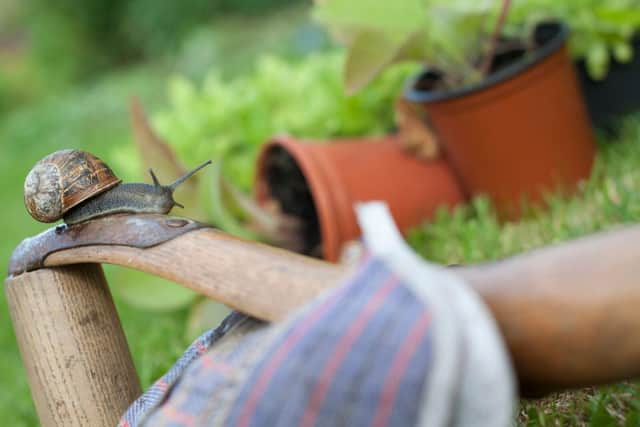Northumberland Wildlife Trust and RHS ask gardeners to make friends with slugs and snails.
and live on Freeview channel 276
The ‘Making Friends with Molluscs’ campaign which launched today - Thursday 14th March aims to encourage gardeners to reconsider the role of these creatures in their gardens.
People in this region can find it out more about it on the Wild About Gardens website: wildaboutgardens.org.uk
Advertisement
Hide AdAdvertisement
Hide AdSlugs and snails have long been viewed as a gardener’s greatest enemy, but out of the 150 species of slugs and snails in the UK, only a small fraction of these pose problems for gardeners.


The majority contribute positively to the garden ecosystem in a number of ways.
While they may not be as valued as earthworms, slugs and snails provide several important services in green spaces. One of their most significant roles is as nature’s clean-up crew - feeding on rotting plants, fungi and dung, helping to recycle nitrogen and other nutrients and minerals back into the soil. They can also clean algae off the glass of greenhouses, leaving behind their trademark trails.
Many of the UK’s much-loved garden visitors, including frogs, song thrushes, and ground beetles, rely on slugs and snails as a key food source. They also make up part of a hedgehog’s diet.
Advertisement
Hide AdAdvertisement
Hide AdBy supporting them, gardeners indirectly support a diverse array of wildlife. In addition, territorial slugs, such as leopard slugs, can be helpful in warding off other species of slug and therefore protecting plants from grazing.
Follow these five tips to live harmoniously alongside slugs and snails:
- Provide shelter: Create habitats for slugs and snails by leaving log piles, mulch, and natural debris in garden areas. These spaces offer shelter and a food source for these creatures, and it may make them less likely to venture out into your vegetable bed.
- Selective planting: Choose plants that are less attractive to slugs and snails or are more resilient to their feeding habits, such as lavender, rosemary, astrantia, hardy geraniums, hellebores and hydrangeas.
- Barriers: Implement barriers – such as copper tape and wool pellets – which may provide some protection for vulnerable plants from slug and snail damage.
- Handpick and monitor: Regularly inspect plants for signs of slug and snail damage, and manually remove any you find, relocating them to your compost heap or areas with less vulnerable plants. Consider evening patrols with a torch, as slugs and snails are most active at night-time.
- Encourage predators: Create a haven for natural predators of slugs and snails, such as ground beetles, song thrushes, frogs, and toads, by providing suitable habitats, such as long grass, log piles and wildlife-friendly ponds. Predators help to naturally regulate slug and snail populations, keeping their numbers in balance.
Duncan Hutt, Director of Conservation at Northumberland Wildlife Trust says
“Snails and slugs play such an important role in consuming dead plants, animals and fungi, recycling nutrients back into the soil and creating nutritious compost, great for growing vegetables, fruit and flowers.
Advertisement
Hide AdAdvertisement
Hide Ad“We want everyone to avoid using pesticides which can indiscriminately harm other creatures too. You can grow a range of plants that snails and slugs tend to not eat, such as onions and hardy herbs, instead of trying to control them. These marvellous molluscs help to enrich and aerate the soil, and they’re also a great food source for other incredible animals such as newts and beetles.”
Northumberland Wildlife Trust is all set to celebrate slugs and snails at its Gardening for Wildlife Morning on Wednesday 10th April.
The free event, which is part of Community Garden Week, is being held at the wildlife charity’s St Nicholas Park nature reserve in the grounds of St Nicholas Hospital in Gosforth.
Between 10:30 and 12 noon, members of the public, no matter what their age or level of gardening knowledge, can drop in and talk to the Trust’s gardening and plant experts about how to make their gardens more attractive to wildlife. There’s also a free Wild About Gardens booklet for everybody who turns up.
The event has been made possible thanks to players of People’s Postcode Lottery.